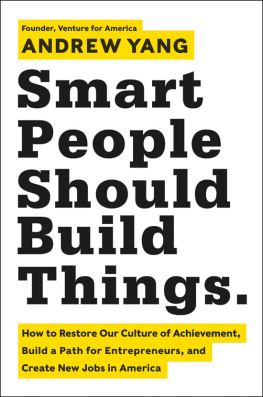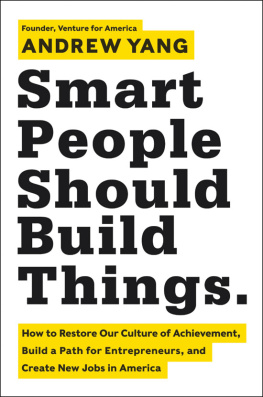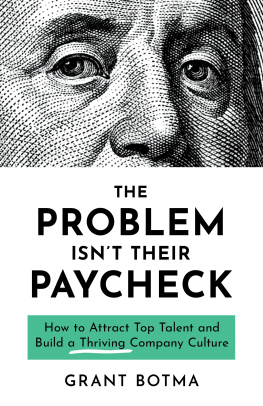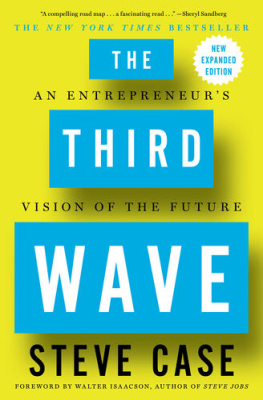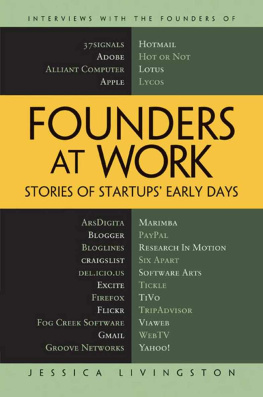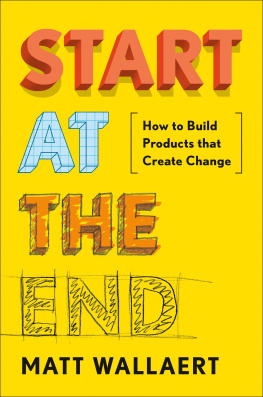This book is dedicated to everyone who helped bring Venture for America into the world and continues to support our organizations progress. Were grateful each day.
Contents
W eve got a problem: our smart people are doing the wrong things. If we can get them to do the right things, it will transform the country.
It was 2000, and Charlie Kroll was a senior about to graduate from Brown University. He had his heart set on returning to New York City and becoming an investment banker; he studied economics and was the treasurer of the Brown Investment Group. To his surprise, he didnt get the position he wanted with Morgan Stanley, despite being a strong student who had interned at Morgan Stanley and UBS in New York and London the previous two summers. He recovered from his disappointment quickly, and started a website development company, Andera, out of his dorm room. He submitted his business plan to a college competition, and though he didnt win, his adviser saw a spark in Charlie and offered to invest some seed money. Over the following year, Charlie was able to raise $300,000, and his company grew from one to six employees. Things looked promising.
Then, in 2001, the tech bubble burst. No one wanted to pay top dollar for a website. Andera struggled, even threatening to miss payroll a few times, with Charlie worrying what hed say to his employees as he let them go. At one point, he even asked his girlfriend Jen to invest, which she did. She must have had real faith in him, because Charlie wasnt sure where his company was headed at the time.
Charlie fought to keep Andera afloat. During his third year in business, he met with the head of a regional bank and pitched Anderas website services to her. After he gave his pitch, she said, Thanks for the presentation, but let me tell you what Im really interested in. We need something that would help our customers open accounts online more easily. Is that something you could help with?
Sure, Charlie said. We can do that. He then went back to his office to figure out just what would be involved in solving the bank executives problem. A few months later, his company had a new customer and a new direction. Andera found its niche helping regional banks provide some of the same online convenience as the big national banks. It gained dozensand then hundredsof community banks as customers. Jens investment paid off in more ways than one; the couple got married a few years later and now they have two beautiful children. Today, Andera is a multimillion-dollar software company employing almost a hundred people in Providence, Rhode Island, a city that has an unemployment rate of over 10 percent.
If Morgan Stanley had offered Charlie that job, Andera probably wouldnt exist, Providences unemployment rate would be a little bit higher, and regional banks would be a little bit less competitive. But what if Charlie were the norm instead of the exception? What if the same level of talent that is currently heading to finance or law school or management consulting instead went to starting or developing growth companies like Andera? What if 25 percent of our top graduates went to startups around the country each year instead of to Wall Street? How long would that take to generate thousands of new jobs, companies, opportunities, and even industries?
This book is going to help answer these questions.
I believe theres a basic solution to our countrys economic and social problems. We need to get our smart people building things (again). Theyre not really doing it right now. Theyd like to. But theyre being led down certain paths during and after college and told not to worry, they can figure it out later.
Take me, for instance. I wasnt nearly as enterprising as Charlie when I graduated from Brown in 1996. I had a general desire to be smart, accomplished, and successfulwhatever that meant. So I went to law school and became a corporate attorney in New York.
I figured out I was in the wrong place after a number of months working at the law firm. I left in less than a year and cofounded a dot-com company, Stargiving, which helped raise money for celebrity-affiliated nonprofits. It was extraordinarily difficult. My company failed spectacularly, but I recovered. I went to work for a mobile software company, Crisp Wireless, and then a health care software company, MMF Systems, over the next five years, eventually becoming the CEO of a test-prep company, Manhattan GMAT, in 2006.
I spent five years running Manhattan GMAT, helping young people get into business school. I taught our corporate classes of investment banking analysts and consultants at Goldman Sachs, McKinsey and Company, JPMorgan Chase, Morgan Stanley, and Deloitte, as well as hundreds of individual students over the years. Some were exactly where they wanted to be. But there seemed to be just as many top-notch young people who wondered why they didnt like their jobs more. They sought a higher sense of engagement with their work and their careers. Sometimes they would put words to what they were looking for; theyd say they wanted something entrepreneurial or to be really excited about something.
By the time my company was acquired by Kaplan and its parent, the Washington Post Company, in 2009, I knew a few things. I knew that there were promising startups and growth companies all over the country that needed talent to expand and thrive. I knew firsthand that there was an army of talented, ambitious, somewhat directionless young people whod love to work for a startup. And I knew that if we could connect these two groups, wed help everyone: the individuals, the companies, cities and communities around the country, the economy, and society as a whole.
When I was younger, I subscribed to a general view of our educational system that goes something like this: If you study hard and do well in high school, youll get into a good college. Where you go to college is very important. Then, if you do well in college, perhaps youll go on to law school or med school, or maybe academia if youre an intellectual sort. In any case, if youre smart and work hard, youll wind up with a good job.
That good job, in this scenario, is a job that requires a lot of complex analytical thinking and pays well, like investment banking or management consulting. If a student takes a professional route, becoming a lawyer, doctor, accountant, or dentist, he or she will need additional years of special training to develop professional skills and judgmentall very attractive to high achievers.
This is our system of training and employment, and it functions very well. Smart, hardworking kids go to good schools and get trained for good jobs. The job market operates with great efficiency, and that is a big reason why our economy is so successful.
Theres another view of the current system, thoughthat its a mess. Ambitious college students have no real idea what to do upon graduation, but theyre trained to seek the next level. Many apply to law school, grad school, or even medical school because of a vague notion of status and progress rather than a genuine desire or natural fit. Those who try to do something independently often find themselves frustrated by their lack of rapid advancement, and so default to a more structured path of law school, business school, or graduate school. The concentration in professional services leads our national university graduates to congregate in a handful of metropolitan areasprimarily New York City, Silicon Valley, Boston, and Washington, DC. Those who become bankers or consultants are highly paid and heavily socialized, yet many become disaffected due to a lack of purpose or unsustainable lifestyle, and some simply discover they dont enjoy their roles. We train thousands more lawyers each year than legal jobs exist for, and hundreds more academics than there are academic jobs. Each path throws off waves of refugees who are often at a loss as to what to do with themselves, only at that point theyre in their late twenties, possibly in debt or used to an expensive lifestyle, and trained to do something narrow and specific.

